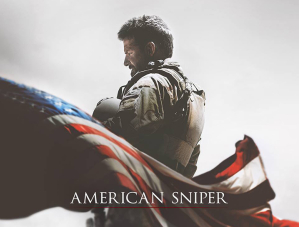
The film "American Sniper, which tells the real-life story of Navy SEAL Chris Kyle and is portrayed by Bradley Cooper, has been a record-breaking box office winner in the United States in its opening weekend. Now director Clint Eastwood's film has grabbed the attention of the culture wars from all sides.
According to Eliana Dockterman of Time, the Academy Award-nominated film has received criticism in some precincts who claim that a "murderer" is being glorified in a flick having pro-war leanings. However, screenwriter Jason Hall maintains that he wrote about a beleaguered soldier instead of a political statement.
"People see the movie poster, and it's got a guy and the American flag, and they know Clint Eastwood - the 'Dirty Harry' guy and the Republican convention guy - directed it," Hall said. "So they think it's some jingoistic thing. I would challenge that in a big way."
Hall argued that Kyle was "a man who believed in something," and the government needed his services in a time of war. He elaborated on the costs the Navy SEAL endured as a result of making that choice to join the military.
"It cost him his physical health, his mental health and almost cost him his family," Hall said. "Chris probably would have paid the price over and over again if he'd been asked, which is both patriotic and totally tragic."
According to Dockterman, Hall bristled at the notion that Kyle's story is one that glorifies war.
"Chris and those other guys, they didn't pick the war," Hall said. "The movie isn't about whether we should have been in Iraq or not. It's about how war is human."
Dockterman reported that the original controversy surrounding "American Sniper" bubbled up after Canadian actor Seth Rogen and director Michael Moore made some comments on social media about the film that were interpreted as criticisms by many people.
"'American Sniper' kind of reminds me of the movie that's showing in the third act of 'Inglorious Basterds,'" Rogen wrote on Twitter.
Rogen later issued a clarification on Twitter about his initial message.
"I just said something 'kinda reminded' me of something else," Rogen wrote. "I actually liked 'American Sniper.' It just reminded me of the Tarantino scene."
Moore, who is famously known for making documentaries mostly from a liberal perspective, expressed on Twitter that snipers were "cowards" in his opinion.
"My uncle [was] killed by sniper in World War II," Moore wrote. "We were taught snipers were cowards. Snipers aren't heroes, and invaders are worse."
The filmmaker stayed firm to his stance on Twitter.
"If you're on the roof of your home defending it from invaders who've come 7,000 miles, you are not a sniper, you are brave, you are a neighbor," Moore wrote.
Moore claimed that his comments were in no way connected to "American Sniper" or even the Navy SEAL specifically, according to Kelly Lawler of USA Today. He stated in a Facebook post that he was actually quoting from his father instead, who also served in World War II in the South Pacific.
"My dad always said, 'Snipers are cowards. They don't believe in a fair fight. Like someone coming up from behind you and coldcocking you. Just isn't right. It's cowardly to shoot a person in the back. Only a coward will shoot someone who can't shoot back,'" Moore wrote.
Moore then elaborated on the actual film in question.
"Awesome performance from Bradley Cooper," Moore wrote. "One of the best of the year. Great editing. Costumes, hair, makeup superb!"
Moore added that although Eastwood may have Vietnam and Iraq "confused in his storytelling," the movie also managed to express "anti-war sentiment." He also thought the ending of the film was "touching."
According to USA Today, other big names responded to Moore's initial comments on social media.
"He's kidding, right?" actor Rob Lowe wrote on Twitter, including a link to the controversial story.
"Michael Moore should spend a few weeks with ISIS and Boko Haram," Newt Gingrich wrote on Twitter. "Then he might appreciate 'American Sniper.' I am proud of our defenders."
Although Hall won't elaborate on whether or not the film had a political agenda, he told Dockterman that the U.S. government should do a better job on taking care of its veterans.
"When Chris came back, he was drinking his face off, his marriage was going through some issues. It took him years to get back, spiritually, to the guy he was before the war," Hall said, noting that many veterans who come home have no work or a place to live. "I hope every time a politician decides to send us to war, maybe they saw this movie and know the cost of it."






